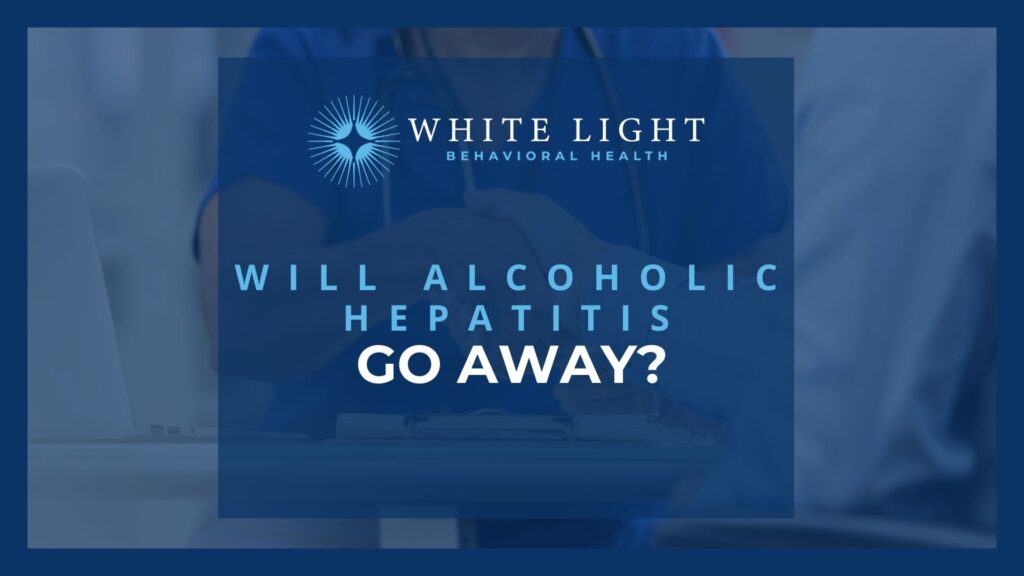What Is Alcoholic Hepatitis?
Alcoholic hepatitis is when the liver becomes inflamed due to excessive alcohol consumption. Consumption of alcohol is the leading cause of liver disease in the United States. Alcoholic hepatitis can cause symptoms such as abdominal pain, nausea, and jaundice (yellowing of the skin and eyes). Other symptoms can include fatigue, loss of appetite, fever, weight loss, and confusion.
In severe cases of alcoholic hepatitis, it can also lead to fluid in the abdomen (ascites) and swelling in the legs or ankles. In extreme cases, it can result in liver failure or death. Therefore, early diagnosis and treatment are essential for reducing severe complications associated with this condition.
Understanding the Stages of Alcohol-Related Liver Disease
Alcoholic liver disease is classified into three stages, depending on the severity of the condition.
1. Alcoholic Fatty Liver
This is the earliest stage of alcoholic liver disease. In this phase of the disease, fat builds up in the liver cells. Symptoms in this stage may be minimal and include fatigue and abdominal discomfort.
2. Alcoholic Hepatitis
In this stage, the inflammation of the liver caused by long-term alcohol abuse leads to liver cell damage and scarring (called fibrosis). As the disease progresses, symptoms like jaundice, abdominal pain or tenderness, fever, nausea, and vomiting may occur. At this phase, medical intervention is essential to prevent further disease progression that will cause permanent damage to the liver.
3. Cirrhosis
At this stage, the liver has been severely damaged by scarring, and the normal functioning of the organ is impaired. This can lead to complications like ascites (fluid build-up in the abdomen), hepatic encephalopathy (brain dysfunction due to liver failure), and even death.
Risk Factors Associated With Alcoholic Hepatitis
Some of the risk factors associated with alcoholic hepatitis include:
- Heavy and prolonged alcohol use: People who drink more than four to five alcoholic drinks per day are at a higher risk of developing alcoholic hepatitis.
- Age: People over 50 are more prone to developing this condition due to weakened immune systems.
- Gender: Men are more likely to develop alcoholic hepatitis than women due to their heavier drinking habits.
- Genetic factors: People with a family history of liver disease have an increased risk of developing alcoholic hepatitis.
- Co-existing conditions: diabetes and obesity can also increase the risk of developing alcoholic hepatitis.
Can Alcoholic Hepatitis Go Away With Medical Intervention?
In many cases, alcoholic hepatitis can be reversed with abstinence from drinking and proper medical treatment. If the condition is caught early enough and treated, you can fully recover from alcoholic hepatitis without long-term liver damage.
However, if left untreated and combined with continued drinking, alcoholic hepatitis can lead to several serious complications. People with advanced alcoholic hepatitis may need a liver transplant.
A study by the National Library of Medicine in 2017 shows that Most doctors request six months of sobriety before they will operate on a transplant, which is often referred to as the “six-month rule.” After surgery, if you relapse and start drinking again, your new liver can become severely damaged.
How Long Does Cirrhosis Take to Develop from Alcoholic Hepatitis?
It is estimated that alcohol-related liver disease will take more than 10 years to progress from fatty liver to cirrhosis. Regular monitoring and early treatment of alcoholic hepatitis can help reduce the risk of progression to cirrhosis.
People usually have to have a liver biopsy to determine the condition’s severity and monitor for progression. Your doctor will also advise you on the best course of treatment, which may include medication, a healthy lifestyle, and abstinence from alcohol.
Also, people with this liver disease should develop a skilled-supportive care team to manage the condition at this late stage and to provide timely diagnosis and treatment for any complications, such as bleeding, sepsis, and renal problems.
Treatment Options for Alcoholic Hepatitis
The most important part of treatment for alcoholic hepatitis is abstaining from alcohol altogether. If you have trouble quitting, your doctor may recommend support groups or medications to help you quit and stay sober. Other essential elements of alcoholic hepatitis treatment include nutritional support, steroid therapy, and anti-infection medications.
Your doctor may also prescribe corticosteroids or pentoxifylline to reduce inflammation and protect the liver cells from further damage. A diet high in antioxidants and essential vitamins may also be recommended to aid the recovery process.
Regular check-ups are essential to monitor your progress and ensure your liver functions properly. You may also need frequent liver function tests to check your liver enzymes and bilirubin levels.
Recovering From Alcoholic Hepatitis
During your visits to the doctor, you will get feedback about how your recovery from alcoholic hepatitis is going. Other signs that indicate the condition is improving are:
- Improved overall health and energy levels
- Weight gain due to improving appetite
- Better sleeping patterns
- Decreased abdominal swelling due to fluid retention
- Reduced jaundice
Living With Alcoholic Hepatitis and Avoiding Relapse
Living with alcoholic hepatitis can be challenging, but managing your condition is possible. Here are some tips for living with this disease.
Practice Self-Care
Taking care of your physical, mental, and emotional health is essential for managing this or any other medical condition. Make sure to get plenty of rest and exercise regularly. This can help reduce stress levels and improve your overall well-being.
Eating a healthy diet is an essential part of managing alcoholic hepatitis. Try to include plenty of fresh fruits and vegetables, lean proteins such as fish and poultry, whole grains, nuts, and seeds in your meals. Avoid processed foods that are loaded with sugar or saturated fats. Staying hydrated is also vital, but avoid sugary drinks like soda.
Connect With Others
It’s essential to develop a support network when coping with alcoholic hepatitis. Dealing with liver disease can cause you to feel depressed and isolated. Support systems can include family, professionals, friends, or peers who understand your challenges while living with this disease. They can provide practical and emotional support to help you through rough times. Joining support groups or online communities can also help you stay connected and share your experiences with others who are going through similar difficulties.
Avoid Relapse
Relapse can be a severe risk for people with alcoholic hepatitis because drinking alcohol is detrimental to their healing progress. Once you’ve abstained from alcohol, avoid situations where drinking is likely to occur. If you have cravings, talk to your doctor or a support group about strategies to cope with them.
Monitor Treatment Progress
Regular check-ups with your doctor are essential for monitoring your condition and treatment progress. Make sure to attend all scheduled appointments, get necessary tests done, and take any prescribed medications as directed by your doctor.
Why an Addiction Rehab Center Could Be a Good Choice for Treatment
If you’re struggling with abstaining from alcohol while managing alcoholic hepatitis, an addiction rehab center can provide a safe and supportive environment to start your recovery journey. Rehab centers like ours offer structured programs for people who have tried to quit drinking alcohol but have not been successful. You may have followed your doctor’s advice by seeing a therapist and seeking out support groups. However, you may have found that these strategies for self-care did not work for you. You can think of seeking out the help of the professionals at a rehab center as a way of taking your self-care to a higher level.
Rehab centers offer services for those suffering from alcohol addiction, including medically supervised detoxification and treatment programs.
Detox
The first step in addiction treatment is detoxification. Detoxification is the process your body goes through when it rids itself of alcohol. Suddenly stopping substance use can lead to physical discomfort and emotional distress. If you have been a heavy drinker for an extended period, the process of detoxification can also be dangerous. This is because you may experience the symptoms of alcohol withdrawal syndrome (AWS). Some of the symptoms of AWS include increased heart rate, respiratory issues, and high blood pressure.
At a rehab center, a medical professional will monitor your health during detox to ensure your physical safety. You may also receive medications to treat alcohol withdrawal symptoms. The goal of the professionals during this stage is to make you as comfortable as possible while your body adjusts to the lack of alcohol in your system.
Treatment Programs
The detoxification stage of your treatment usually takes about three days. Once the alcohol has left your body and you feel a little better, you will work with a professional to develop your treatment plan. The plan may include a residential component where you live at the facility.
Residential programs are appropriate for people who have been drinking heavily for several years and who have made multiple attempts to abstain from alcohol. This level of care may also be helpful for clients who have underlying medical issues like alcoholic hepatitis. The supervised environment ensures that you will not relapse and do further damage to your liver by consuming alcohol during the initial stages of treatment. Therapists will also work with you to develop strategies to face the unique challenges of managing your medical condition while staying sober.
Non-residential programs may work for people with a less severe alcohol addiction who may not have been drinking heavily for an extended period. Strong family support and if you have a full-time job are also factors in choosing this type of program. In addition, many clients enter a non-residential program after spending some time living at a rehab center.
Conclusion
Alcoholic hepatitis is a severe condition that can cause long-term damage to the liver. If you or someone you know is struggling with alcohol dependence that may be exacerbating a liver condition, contact White Light Behavioral Health for help. We are ready to provide comprehensive treatment and support for clients with substance use issues.
Is Alcoholic Hepatitis Reversible?
Yes, alcoholic hepatitis can be reversible, especially if detected and treated early. Ceasing alcohol consumption is crucial for recovery, along with medical interventions such as medication, nutritional support, and possibly liver transplantation in severe cases.
What Are the Symptoms of Alcoholic Hepatitis?
Symptoms of alcoholic hepatitis may include jaundice (yellowing of the skin and eyes), abdominal pain or tenderness, fever, nausea, vomiting, loss of appetite, fatigue, and weight loss. However, not everyone with alcoholic hepatitis experiences all these symptoms.
Does Heavy Alcohol Consumption Cause Anemia?
Yes, heavy alcohol use can indeed lead to anemia. Alcohol disrupts the absorption and use of key nutrients like iron, crucial for making red blood cells. It also harms bone marrow, impairing the production of these cells.
How is Alcoholic Hepatitis Diagnosed?
Alcoholic hepatitis is diagnosed through a combination of medical history, physical examination, blood tests (including liver function tests), imaging tests such as ultrasound or CT scans, and sometimes a liver biopsy to confirm the diagnosis and assess the extent of liver damage.
Can Alcoholic Hepatitis Lead to Cirrhosis?
Yes, if left untreated, alcoholic hepatitis can progress to cirrhosis, which is irreversible scarring of the liver tissue. Cirrhosis significantly increases the risk of liver failure, liver cancer, and other complications.
What Are the Treatment Options for Alcoholic Hepatitis?
Treatment for alcoholic hepatitis typically involves stopping alcohol consumption completely, along with medical interventions such as corticosteroids, pentoxifylline, nutritional therapy, and management of complications. In severe cases, liver transplantation may be necessary.
How Long Does it Take to Recover from Alcoholic Hepatitis?
The recovery time from alcoholic hepatitis varies depending on factors such as the severity of the condition, the individual’s overall health, and treatment adherence. With prompt intervention and abstinence from alcohol, some people may see improvement within weeks to months.
Can Alcoholic Hepatitis Cause Death?
Yes, severe alcoholic hepatitis can be life-threatening, especially if left untreated. Complications such as liver failure, gastrointestinal bleeding, and infections can significantly increase the risk of mortality.
Can Alcoholic Hepatitis Cause Brain Damage?
Yes, severe and chronic alcohol abuse, including alcoholic hepatitis, can lead to brain damage. This condition, known as alcoholic encephalopathy, can result in cognitive impairments, memory loss, coordination problems, and other neurological symptoms.
What Are the Long-Term Effects of Alcoholic Hepatitis?
The long-term effects of alcoholic hepatitis can include chronic liver diseases, such as cirrhosis and liver failure, increased risk of liver cancer, as well as complications affecting other organs such as the brain, heart, and pancreas. It’s essential to seek treatment and abstain from alcohol to minimize these risks.

Share This Post



